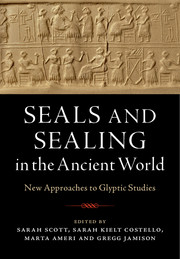 Seals and Sealing in the Ancient World
Seals and Sealing in the Ancient World from Part I - The Ancient Near East and Cyprus
Published online by Cambridge University Press: 24 April 2018
The emergence of cylinder seals in southern Mesopotamia in the fourth millennium BCE was a new technology vital to temple accounting. During the proto-literate period the type of information carried by the seals and their impressions changed; as this happened the first numerical notations and inscribed “proto-writing” emerged. Assyriologists have examined the development of the numerical systems and “proto-writing,” while art historians and archaeologists examine the meaning and function of seal imagery. This chapter analyzes Uruk seal imagery in conjunction with numerical and “proto-writing” technologies to reveal the interconnectedness of seal and inscription as a larger accounting system. It is concluded that the introduction of numerical and ideographic signs occurred simultaneously with a change in the symbolic value of seal imagery, and that the meaning of seal imagery was linked to commodity recording and carried clues regarding social connotations.
To save this book to your Kindle, first ensure no-reply@cambridge.org is added to your Approved Personal Document E-mail List under your Personal Document Settings on the Manage Your Content and Devices page of your Amazon account. Then enter the ‘name’ part of your Kindle email address below. Find out more about saving to your Kindle.
Note you can select to save to either the @free.kindle.com or @kindle.com variations. ‘@free.kindle.com’ emails are free but can only be saved to your device when it is connected to wi-fi. ‘@kindle.com’ emails can be delivered even when you are not connected to wi-fi, but note that service fees apply.
Find out more about the Kindle Personal Document Service.
To save content items to your account, please confirm that you agree to abide by our usage policies. If this is the first time you use this feature, you will be asked to authorise Cambridge Core to connect with your account. Find out more about saving content to Dropbox.
To save content items to your account, please confirm that you agree to abide by our usage policies. If this is the first time you use this feature, you will be asked to authorise Cambridge Core to connect with your account. Find out more about saving content to Google Drive.